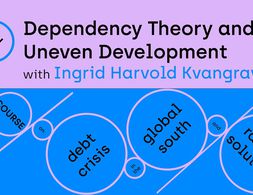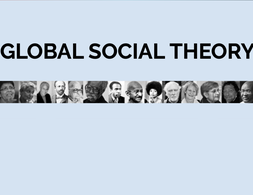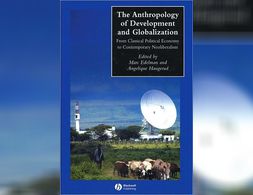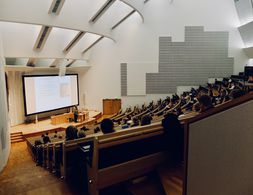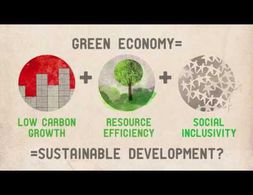✕
525 results
The objective of the course is to explore the main strengths and weaknesses of orthodox and heterodox paradigms within development economics.
A detailed introduction into dependency theory that rethinks its relevance to modern development challenges.
Gender Development and Globalization is the leading primer on global feminist economics and development. Gender is a development issue because social considerations are not easily incorporated into institutions such as policies, regulations, markets and organizations. This process is often referred to as the mainstreaming of gender in development institutions.
After long-time negligence, the Global South and the North-South divide are back on the agenda of development economics again. This book is a neat, accessible introduction into the topic, covering both the current situation and potential remedies from different points of view.
How did the industrialized nations of North America and Europe come to be seen as the appropriate models for post-World War II societies in Asia, Africa, and Latin America? How did the postwar discourse on development actually create the so-called Third World? And what will happen when development ideology collapses? To answer these questions, Arturo Escobar shows how development policies became mechanisms of control that were just as pervasive and effective as their colonial counterparts.
John Christensen from the Tax Justice Network addresses the Modern Monetary Theory idea that governments don't need tax revenues if they want to spend money. Doing so, he sums up the main points made by MMT proponents and their critics, and shows how MMT can be reconciled with another progressive economic narrative: "Modern Tax Theory". While MMT made valuable contributions to the policy debate on fiscal policy, it misrepresents the importance of taxation as a political matter and as a way to generate public revenues. This is where MMT steps in.
In this course you will study the different facets of human development in topics such as education health gender the family land relations risk informal and formal norms public policy and institutions While studying each of these topics we will delve into the following questions What determines the decisions of …
As seen with the United Nations significant promotion of the Sustainable Development Goals (SDGs) in the past few years, the issue of global development is of growing concern to many international organizations. As humanity continues to become more interconnected through globalization, the inequalities and injustices experienced by inhabitants of impacted countries becomes increasingly clear. While this issue can be observed in the papers of different types (e.g., different schools of thought) of economists throughout the world, the work of behavioral and complexity economists offer a unique, collaborative perspective on how to frame decisions for individuals in a way that can positively reverberate throughout society and throughout time.
A central question in development economics literature is, “Why do countries stay poor?” The key disagreements are whether the lack of economic growth stems from institutions or from geography (Nunn 2009). From an institutional perspective, hostile tariff regimes and commodity price dependencies form a barrier to a sectoral shift that would otherwise lead to economic development in developing countries (Blink and Dorton 2011) (Stiglitz 2006).[i]
In this book, Kalyan Sanyal reviews the traditional notion of capitalism and propounds an original theory of capitalist development in the post-colonial context. In order to substantiate his theory, concepts such as primitive accumulation, governmentality and post-colonial capitalist formation are discussed in detail.
'Impressive... provides a very good compendium of what are usually classified as "heterodox" development economics... an excellent volume.' Journal of International Development This important new collection tackles the failure of neoliberal reform to generate longterm growth and reduce poverty in many developing and transition economies.
Gender, Development, and Globalization is the leading primer on global feminist economics and development. Lourdes Benería, a pioneer in the field of feminist economics, is joined in this second edition by Gunseli Berik and Maria Floro to update the text to reflect the major theoretical, empirical, and methodological contributions and global developments in the last decade.
Pluriverse: A Post-Development Dictionary contains over one hundred essays on transformative initiatives and alternatives to the currently dominant processes of globalized development, including its structural roots in modernity, capitalism, state domination, and masculinist values.
What’s inflation? Why is it relevant? And is there an agreed theory about its roots and causes, or is it a contentious concept? That’s what this text is all about: We define what inflation actually means before we delve into the theoretical debate with an interdisciplinary and pluralist approach: What gives rise to it, what factors might influence it, and, consequently, what might be done about it?
A remarkable and insightful tribute into the works of late Malawian development economist, Professor Thandika Mkandawire. Must read for anyone looking to broaden their scope of understanding development as it relates to the African continent.
The volume, released by YSI’s Economic Development Working Group, comprises interviews with 13 scholars from around the world who express a variety of viewpoints on the meaning and relevance of dependency theory in today’s context.
Karl Marx was the greatest champion of the labor theory of value. The logical problems of this theory have, however, split scholars of Marx into two factions: those who regard it as an indivisible component of Marxism, and those who wish to continue the spirit of analysis begun by Marx without the labor theory of value.
This course is an introduction to Development Economics and is concerned with how economists have sought to explain how the process of economic growth occurs, and how – or whether – that delivers improved well-being of people.
This paper attempts to clarify how the European economic crisis from 2007 onwards can be understood from the perspective of a Marxian monetary theory of value that emphasizes intrinsic, structural flaws regarding capitalist reproduction. Chapter two provides an empirical description of the European economic crisis, which to some extent already reflects the structural theoretical framework presented in chapter three. Regarding the theoretical framework Michael Heinrich's interpretation of 'the' Marxian monetary theory of value will be presented. Heinrich identifies connections between production and realization, between profit and interest rate as well as between industrial and fictitious capital, which represent contradictory tendencies for which capitalism does not have simple balancing processes. In the context of a discussion of 'structural logical aspects' of Marx's Critique of the Political Economy, explanatory deficits of Heinrich's approach are analyzed. In the following, it is argued that Fred Moseley's view of these 'structural logical aspects' allows empirical 'applications' of Marxian monetary theories of value. It is concluded that a Marxian monetary theory of value, with the characteristics of expansive capital accumulation and its limitations, facilitates a structural analysis of the European economic crisis from 2007 onwards. In this line of argument, expansive production patterns are expressed, among other things, in global restructuring processes, while consumption limitations are mitigated by expansive financial markets and shifts in ex-port destinations.
Global Social Theory is a large wiki-like project by Gurminder K Bhambra. Its central aim is decolonising and diversifying universities, production of knowledge, and social thought in general.
It represents a large online library divided into three parts: concepts, thinkers, and topics in/of social theory and decolonial thought. Every part comprises of short, introductory articles on an according theme. It may be helpful to give you a general overview (and a list of basic readings) on the most essential areas of social theory: caste, class, and race; civil society; racism; secularism; feminism and many others.
It may also allow students whose university curriculum in sociology, economics, or other social sciences lacks diversity to compensate for that.
In this podcast 'How Economic Theory and Policy Reinforce Racism' William Spriggs, the AFL-CIO’s chief economist, discusses the inadequacies of the pandemic economic rescue package and the influence of mainstream economic theory. He further explores how mainstream economic theory continues to fail everyone, especially Black communities, by disregarding history.
Global Value Chains (GVCs) started to play an increasing and key role in the global economy from the 1990s on. The market mechanism in GVCs supports industrialisation in the Global South and under certain conditions product and process upgrading. But GVCs do not lead to the catching-up of countries in the sense of them approaching real GDP per capita levels comparable with developed countries. These arguments are supported by a critical interpretation of the traditional trade theory, the New Trade Theory and specific approaches to explain GVCs, especially different governance structures and power relationships. Several case studies support these arguments. For catching-up, countries need comprehensive horizontal and vertical industrial policy and policies for social coherence. The small number of countries which managed to catch up did this in different variations.
This syllabus opens a literary overview of must-read papers in the field of development economics.
The goal of the course is to deepen students’ understanding of the Latin American development experience by viewing it through a gender lens.
This panel is about discussing the international development discipline from a critical perspective, exploring how the current practice entangles with Eurocentric/neo-colonial thoughts and how can we move beyond them.
The Anthropology of Development and Globalization is a collection of readings that provides an unprecedented overview of this field that ranges from the field?s classical origins to today?s debates about the ?magic? of the free market.
Sustainable Development has become dominant in policy debates in the last two decades. Standard models in neoclassical economics as taught in undergraduate classes fail to capture the complex relationships between the economy and the environment.
This course is part of the SDG initiative addressing the UN Sustainable Development Goals, specifically for the following SDGs [1, 8, 10 and 16].
Approaching the law of nature that determines all forms of economy. The bulk of economic theory addresses the economic process by setting out on a catalogue of aspects, seeking the laws in the aspects and hoping to get together a reliable view of the whole.
What is sustainable development and what is the idea of a green economy? What is the role of the green economy in the current triple crisis? The short video discusses the concept and in particular the concerns about a green economy, especially with regards to inequality and poverty. The short statements in the video also reflect other possibilities of transformation.
Dependency in Central and Eastern Europe - Self-reliance and the need to move beyond economic growth
In this essay, the author takes a critical perspective on the pursuit of growth as the solution for providing for environmental sustainability and economic stability in the countries of Central and Eastern Europe.
Drawing from the framework of dependency theory and presenting brief insights into European core-periphery relations the author then argues for the implementation of an alternative strategy to development that is built around the concept of self-reliance.
The book critically engages with various Marxian perspectives on the dynamics on development and social progress It specifically engages with some key words in Marxian theory including Marx s early work on capitalist development and his later works on underdeveloped Russia Lenin s thesis on imperialism as a hurdle for …
We use cookies on our website. Click on Accept to help us to make Exploring Economics constantly better!


